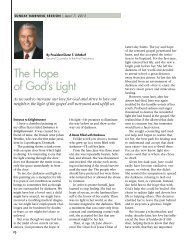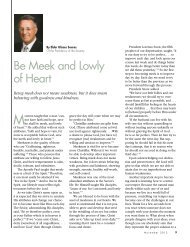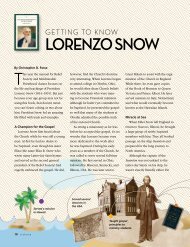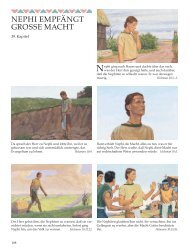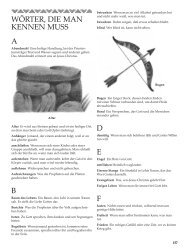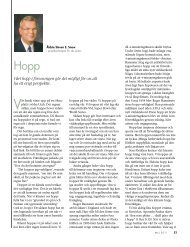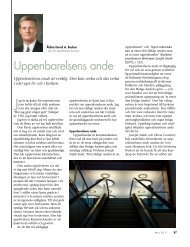August 2006 Ensign - The Church of Jesus Christ of Latter-day Saints
August 2006 Ensign - The Church of Jesus Christ of Latter-day Saints
August 2006 Ensign - The Church of Jesus Christ of Latter-day Saints
Create successful ePaper yourself
Turn your PDF publications into a flip-book with our unique Google optimized e-Paper software.
30<br />
I am not referring to those who use credit cards as<br />
a convenience, paying the balance in full each month.<br />
Rather, I am referring to those who use credit to live a<br />
debt-based lifestyle. Many people find themselves unable<br />
to pay more than the minimum payments each month.<br />
<strong>The</strong> credit card companies like these people because they<br />
make the most money from them.<br />
For example, if only the minimum<br />
payment is made each month, a $2,500<br />
<strong>Christ</strong>mas shopping spree—with a<br />
credit card that charges 18 percent<br />
interest and requires a minimum payment<br />
<strong>of</strong> interest plus 1 percent <strong>of</strong> the<br />
balance—will take 20 years and 4<br />
months to pay <strong>of</strong>f. And that’s assuming<br />
that no additional charges are made<br />
during the 20 years and 4 months. With<br />
interest, that $2,500 shopping spree will<br />
end up costing about $5,865.<br />
In Proverbs we read that “the borrower<br />
is servant to the lender” (Proverbs<br />
22:7). Consumer debt not only creates<br />
financial and emotional bondage, but it<br />
strains marriage and family relationships<br />
and prevents spiritual progression.<br />
In April 2004 general conference,<br />
Elder Wirthlin reminded us: “<strong>The</strong> wise<br />
understand the importance <strong>of</strong> saving<br />
to<strong>day</strong> for a rainy <strong>day</strong> tomorrow. <strong>The</strong>y<br />
have adequate insurance that will provide<br />
for them in case <strong>of</strong> illness or death.<br />
Where possible, they store a year’s<br />
supply <strong>of</strong> food, water, and other basic<br />
necessities <strong>of</strong> life. <strong>The</strong>y set aside money<br />
in savings and investment accounts.” 4<br />
Principle 8: Teach children sound<br />
money-management skills.<br />
Elder Wirthlin also noted that “too many<br />
<strong>of</strong> our youth get into financial difficulty<br />
because they never learned proper principles<br />
<strong>of</strong> financial common sense at home.<br />
Principle 7: Save for the future.<br />
Teach your children while they are young.<br />
<strong>The</strong> Lord counseled the early <strong>Saints</strong>,<br />
Teach them that they cannot have some-<br />
“Save all the money that ye can . . . that in<br />
thing merely because they want it. Teach<br />
time ye may be enabled to purchase land<br />
them the principles <strong>of</strong> hard work, frugality,<br />
for an inheritance” (D&C 48:4). <strong>The</strong> basic<br />
and saving.”<br />
concept <strong>of</strong> inheritance is providing for future needs. <strong>The</strong><br />
Old Testament story <strong>of</strong> Joseph in Egypt illustrates the wisdom<br />
<strong>of</strong> saving for future events, for times may come when<br />
financial and material resources are scarce or beyond our<br />
ability to obtain (see Genesis 41). <strong>The</strong> Lord’s command to<br />
save still applies to each <strong>of</strong> us to<strong>day</strong>.<br />
5<br />
Bishop H. David Burton, Presiding Bishop <strong>of</strong> the<br />
<strong>Church</strong>, observed that parents, especially those parents<br />
who can afford to say yes, “have a difficult time saying no<br />
to the demands <strong>of</strong> overindulged children. <strong>The</strong>ir children<br />
run the risk <strong>of</strong> not learning important values like hard<br />
work, delayed gratification, honesty, and compassion.” 6<br />
In the story <strong>of</strong> Joseph in<br />
Egypt, he interprets the<br />
Pharaoh’s dream to mean<br />
that Egypt would have seven<br />
years <strong>of</strong> plenty followed by<br />
seven years <strong>of</strong> famine. This<br />
story illustrates the wisdom<br />
<strong>of</strong> saving for the future.<br />
LEFT: JOSEPH MAKES HIMSELF KNOWN TO HIS BRETHREN; RIGHT: DETAIL FROM THE DISCIPLES PLUCKING CORN ON THE SABBATH, BOTH BY GUSTAVE DORÉ



